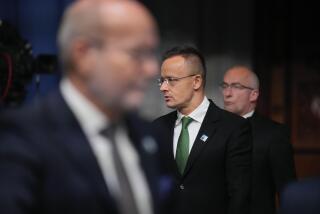E. Europe Development Bank Launched : Aid: Leaders of 38 nations initiate $12-billion effort to help emerging democracies.
- Share via
LONDON — In an atmosphere of hope and caution, leaders of 39 nations met in London on Monday to launch an Eastern European development bank that French President Francois Mitterrand called “the first institution of the new Europe.”
Hungarian Prime Minister Jozsef Antall, expressing the aspirations of the former Soviet satellites of Eastern Europe, said the European Bank for Reconstruction and Development must enable emerging democracies “to integrate ourselves into the world economy through the evolution of a healthy market economy.”
But some Eastern Europeans expressed concern that the bank, with an initial $12 billion in capital, might not be up to the enormous task. “I’m afraid there is more political commitment than financial commitment,” Czech Finance Minister Vaclav Klaus said in an interview.
Czechoslovakia needs more Western firms to invest in its economy and Western countries to open their markets to Eastern goods, Klaus said, referring to the 12-nation European Community’s reluctance to buy Eastern European farm products, textiles and steel.
Hungarian Finance Minister Mihaly Kupa, sounding somewhat more upbeat, said his country has benefited from about half of the private foreign investment in Eastern Europe since the revolutions of 1989. Such American industrial giants as General Motors Corp. and General Electric Co. have led the way. But Kupa said Western service industries, particularly banking and tourism, have failed to seize business opportunities in his country.
Of the 39 nations participating in the bank, 19 were represented Monday by heads of state or government. Leading the delegation from the United States, the bank’s biggest single contributor at $1.2 billion, was Treasury Secretary Nicholas F. Brady.
Jacques Attali, the French economist and former personal adviser to Mitterrand who is the bank’s president, said the bank will use its capital to help Eastern Europe with basic building blocks of free-market economies. It will finance not only roads and telecommunications systems but also stock exchanges and financial and legal systems.
More than that, he said, the bank will provide advice and encouragement aimed at promoting not only capitalism but also democracy. Among modern development banks, he said, the European bank is unique in having explicitly political as well as economic goals.
The seven nations qualifying for the bank’s assistance are Poland, Hungary, Czechoslovakia, Romania, Bulgaria, Yugoslavia and the Soviet Union.
More to Read
Sign up for Essential California
The most important California stories and recommendations in your inbox every morning.
You may occasionally receive promotional content from the Los Angeles Times.













